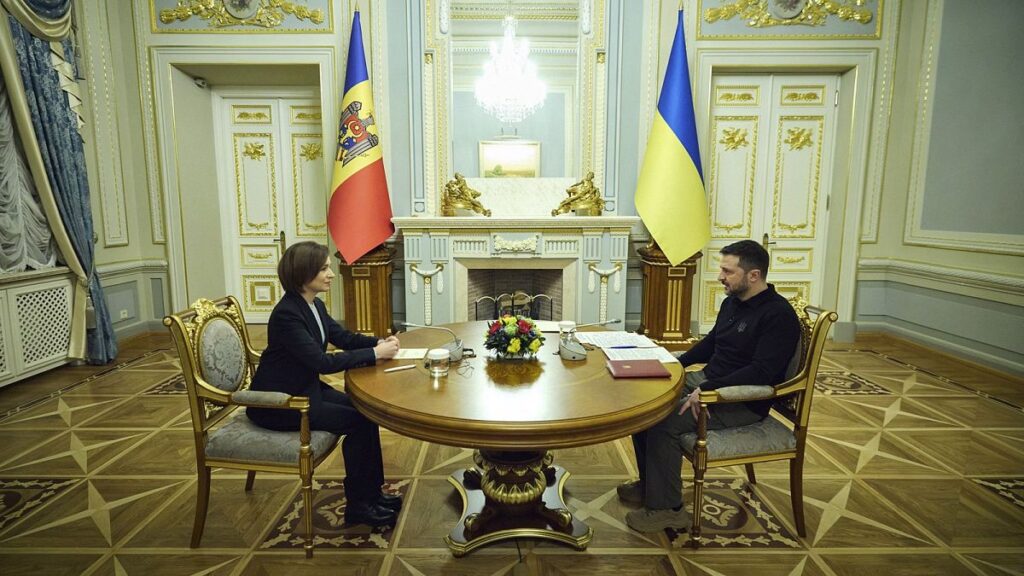The European Union continues to resist decoupling the membership applications of Ukraine and Moldova, fearing that such a break-up would deal a heavy blow to Kyiv at a time when accession is seen in the context of security guarantees.
The idea of splitting the two bids, which were filed almost simultaneously in the early days of Russia’s full-scale invasion and have since been treated in parallel, has gained traction in recent months due to Hungary’s unassailable veto on Ukraine’s ambitions.
The parliamentary elections in Moldova, scheduled for 28 September, have further stimulated the debate, as making progress on membership could help the country counteract Moscow’s hybrid attempts to interfere in the poll and polarise society.
“The reason why we have a new momentum on enlargement is due to Ukraine,” Marie Bjerre, Denmark’s minister for European affairs, said on Tuesday as she hosted her counterparts in Copenhagen for an informal discussion focused on the matter.
“It would not be fair to leave Ukraine alone. We need to move forward also with Ukraine.”
Both Kyiv and Chișinău have fulfilled the technical criteria to open the first cluster of accession negotiations, known as Fundamentals, which covers key topics such as democracy, human rights, security, the judicial system and public procurement.
But opening a new cluster requires unanimity.
Denmark, the current holder of the EU Council’s rotating presidency, has vowed to apply “maximum pressure” on Hungary to break the deadlock, which began more than a year ago.
Budapest has invoked various reasons, such as the war, energy security and agriculture, and launched a national consultation among its citizens to justify its veto.
“Hungary does not make any connection between any candidate country,” said the country’s representative, János Bóka, upon arriving at the meeting.
“We are supporting Moldova’s progress, and we are against any linkage between countries because we believe it’s a merit-based process.”
The stalemate has exasperated other member states.
Jessica Rosencrantz, Sweden’s minister for European affairs, said the veto was “totally unacceptable”, while her French counterpart, Benjamin Haddad, accused Budapest of holding up the accession process for “domestic reasons”.
“What Hungary is doing on Ukraine is having an impact on other countries that are actually making good progress in reforming, like Moldova,” Haddad said in Copenhagen.
“Moldova belongs in the European Union, its European path is irreversible, especially in the context where we can see the pressure and the interference coming from Russia.”
A ‘difficult’ conversation
Despite mounting political pressure from across the bloc, Hungary has not budged or sent any signal indicating it might do so anytime soon.
The refusal has left Moldova awkwardly caught in the political crossfire. The country is keen to advance its path to EU membership, but is wary of the consequences of leaving its neighbour behind as it fights a brutal war.
Cristina Gherasimov, Moldova’s deputy prime minister for European integration, who was invited to Tuesday’s meeting, defended the need to keep the two candidates together.
“We are very much looking forward to a solution both for Moldova and Ukraine,” she said.
“It’s important for us, for our security, for our own accession path, that as a region, we’re stable, we’re secure, and for that, we need a stable and secure Ukraine.”
Member states worry that decoupling Moldova from Ukraine would legitimise Hungary’s veto and weaken the message of unity and support that the EU is trying to project during the peace negotiations promoted by Donald Trump, which have at times seen the US president echo the talking points of his Russian counterpart, Vladimir Putin.
In early August, just before meeting with Trump in Washington, Ukrainian President Volodymyr Zelenskyy issued a pointed warning against decoupling.
“There can be no division between Ukraine and Moldova,” Zelenskyy said.
“If such a division takes place, that will automatically mean that Europe is divided on Ukraine, that Europe does not have a common position on (security) guarantees.”
The foreign-policy dimension weighs heavily on the deliberations.
“A united Europe is a clear answer towards Russia, China and also the United States,” said Germany’s Gunther Krichbaum, backing the coupling.
Poland’s Ignacy Niemczycki said that Moldova had not officially requested decoupling, but that “when the time comes, we’re open to having this discussion”.
“We really feel that we want to send positive signals to the Ukrainian people, not negative, so it’s obviously a difficult situation,” Niemczycki noted.
At the end of the ministerial meeting, Marta Kos, the European Commissioner for Enlargement, praised Ukraine and Moldova for doing “their homework” and underlined the urgency of unblocking the situation.
“EU enlargement has become somehow entangled in this geopolitical contest between free, democratic societies on one side and authoritarian regimes on the other side. And we see this, of course, most brutally in Ukraine,” Kos said.
“But we see it also in a more subtle, hybrid way in other candidate countries, such as the Republic of Moldova,” she added. “We really see huge engagement financially from the side of Russia to bring the Republic of Moldova away from the European path.”
Kos quoted a new Eurobarometer showing that 56% of EU citizens are in favour of enlargement, 26% not very much in favour, and 12% not in favour at all. When breaking down by candidates, 52% support Ukraine’s accession versus 41% who oppose.
Read the full article here


